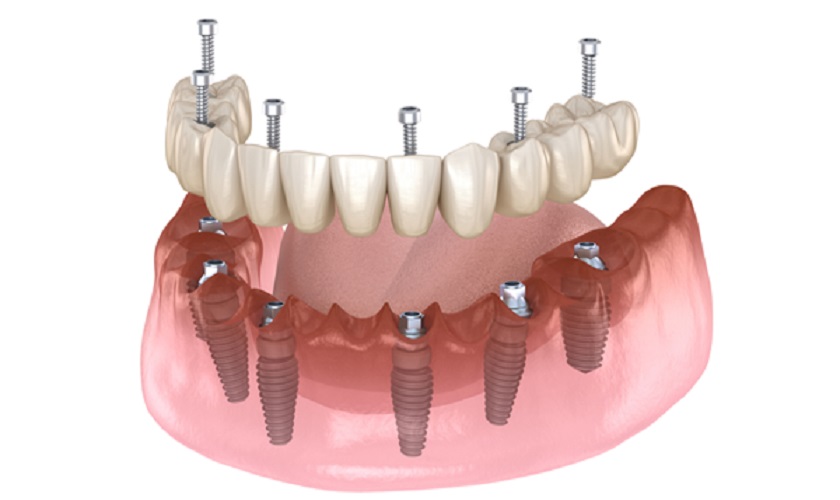Implant All on 6 is one of the most advanced denture implant methods. It is popular because it brings a lot of benefits to people who have lost teeth. This method was born to overcome the 3 most significant weaknesses of removable dentures. Before finding out the optimal point of All on 6 dental implants, you need to know what all-on 6 dental implants problems.
What is an ALL-on-6?
Implant All on 6 is a standard implant method. But with the All on 6 technique, up to 6 Implant posts are implanted on the same jaw. The implant location is the upper or lower jaw depending on the state of your tooth loss. At this time, these 6 Implant posts play the role of supporting the porcelain teeth of the whole jaw, the doctor will design 14 porcelain teeth to suit each person. All on 6, just need to implant 6 Implant posts, and you can restore lost teeth on the whole jaw.
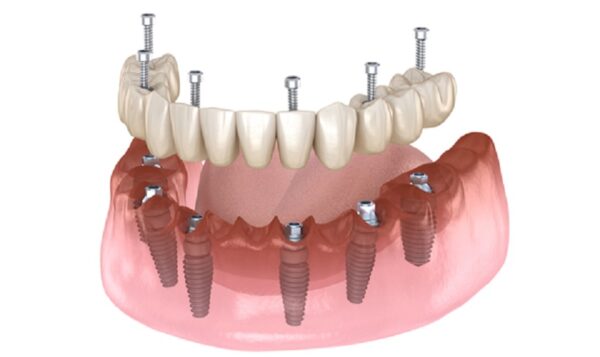
Cases should and should not implant All On 6 Implant
What are all on 6 dental implants problems? The All On 6 Implant method is suitable for:
- People who have lost all of their upper or lower teeth or both jaws due to external influences, old age, or congenital factors.
- People who have lost all teeth or jawbones are not qualified or not healthy enough to implant many times.
- Dental implant with economical cost, quick treatment time, and desired results.
In addition, it should be noted that Implant All On 6 can only be performed if your jawbone is still of sufficient quantity and quality. Besides, not all people who have lost all teeth can be replanted with the All On 6 Implant technique at the time of examination. In fact, there are still some temporary contraindications:
- People with gingivitis, periodontitis, etc.
- People who use alcohol and smoke
- People undergoing chemotherapy or radiation therapy.
- People who are suffering from systemic diseases such as diabetes, blood pressure, heart disease, osteoporosis, etc.
- For people with bone deficiency, bone loss due to long-term tooth loss does not immediately restore.
- Pregnant women
- Children under 16 years of age who have lost teeth are not recommended for dental implants. The reason is that at the age of 16, the jawbone is still not firmly fixed, and the bone density is still quite low.
The subjects mentioned above can still have Implant All On 6. However, the doctor will have to carefully examine and based on the problems they encounter advise when is the most suitable time to plant teeth. To know if you are eligible for Implant and to ensure safety, you should go to the dentist directly, to receive advice on the best solution for you.
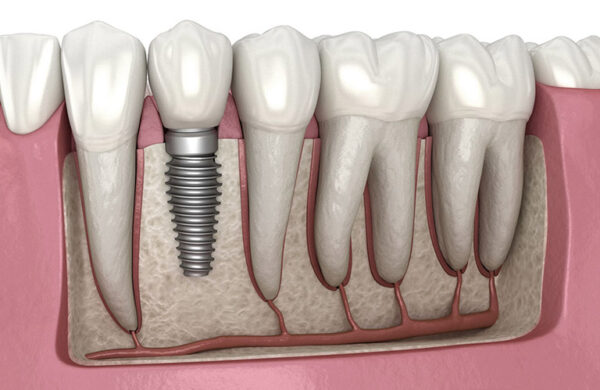
How does the ALL-on-6 work?
Implant All on 6 is a form of Implant as usual. But in All on 6, up to 6 Implant posts are implanted on the same jaw. The implant position is the upper or lower jaw depending on the state of your tooth loss. All on 6 uses 6 Implant posts in which 4 middle pillars are placed in the position of the front teeth and 2 pillars on both sides are placed in the position of the back teeth (molars), helping to support the teeth firmly.
Steps in the ALL-on-6 implant procedure
Step 1: Probe and check the indicators
The first important step is to do an oral exam and listen to the client’s wishes. Next, a Panorex film will be taken to check the overview and height of the jawbone. Then there is a CT Cone Beam scan to survey in three dimensions, check the quality, bone mass, blood vessels, and nerves…, Based on the results, doctors can maximize the specific condition and conduct a number of tests to ensure absolute safety for the client’s health.
Step 2: Make a treatment plan and take jaw impressions
The doctor will draft a treatment plan and associated costs based on the client’s health information. After that, the teeth will be taken with 3D scanning technology in the mouth, based on the parameters with CAD / CAM techniques, in collaboration with specialized Implant design software, will design the implant surgical guide tray, print the surgical tray with a 3D printer, produce temporary dentures … to serve the treatment process.
Step 3: Implant surgery
The whole process is carried out in an absolutely sterile and aseptic environment, applying modern machinery. After attaching 4 or 6 Implant posts, temporary teeth will be fixed immediately after surgery to help customers not have problems living and chewing.
Step 4: Attach the porcelain jaw on the Implant post & Periodic re-examinations
You will have your teeth tested and adjusted by the doctor to be most comfortable to use, then fix the teeth on the Implant post. Dental implants are manufactured monolithically according to CAD / CAM techniques to achieve lifelike naturalness and perfect durability. And then periodically re-examine according to the instructions of the treating doctor.
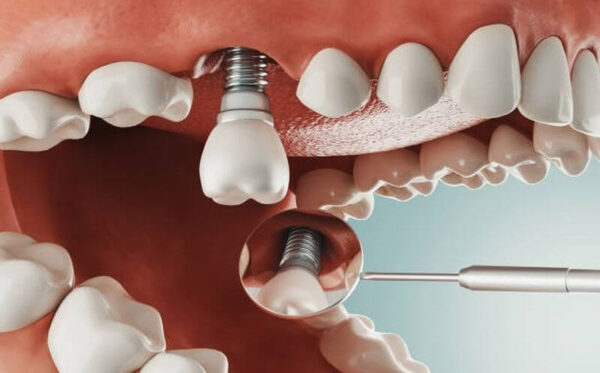
All on 6 dental implants problems
All-on-6 dental implant is a type of dental implant that can replace all teeth on one arch. They are a good choice for people who have lost all of their teeth due to gum disease, tooth decay, or other reasons. Here are the all-on 6 dental implants problems:
- Infection: Infection is a risk with any surgical procedure, including all-on-6 dental implants. If an infection occurs, it can lead to pain, swelling, and difficulty chewing. In some cases, an infection can also lead to the failure of the implant.
- Bone loss: Bone loss can occur around the implants if they are not properly cared for. This can lead to the implants becoming loose or even failing.
- Nerve damage: In rare cases, nerve damage can occur during the surgery to place the implants. This can lead to numbness or tingling in the face or lips.
- Allergic reaction: Some people may have an allergic reaction to the materials used in all-on-6 dental implants. This can cause symptoms such as swelling, itching, and rash.
- Implant failure: In rare cases, an implant may fail. This can happen for a variety of reasons, such as poor bone quality, infection, or trauma.
- It is important to talk to your dentist about the risks and benefits of all-on-6 dental implants before you decide if they are right for you.
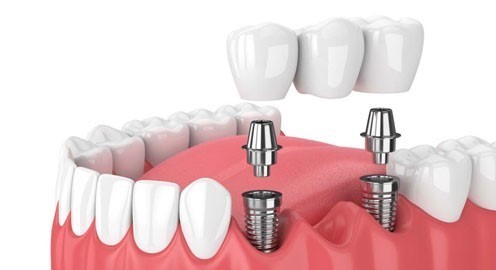
Tips to help reduce the risk of problems with all-on-6 dental implants
Here are some tips to help reduce the risk of problems with all-on-6 dental implants:
- Choose a qualified dentist: Make sure to choose a dentist who is experienced in placing all-on-6 dental implants.
- Follow your dentist’s instructions: Follow your dentist’s instructions for caring for your implants after the surgery. This includes brushing and flossing your teeth regularly, and avoiding chewing hard foods.
- Get regular checkups: Get regular checkups with your dentist to make sure that your implants are healthy and properly cared for.
- Maintain good oral hygiene: Good oral hygiene is essential for the long-term success of all-on-6 dental implants. Brush and floss your teeth twice a day, and use a soft-bristled toothbrush.
- Avoid hard foods: Hard foods can put stress on your implants and increase the risk of complications. Avoid chewing on hard objects, such as ice, nuts, or hard candy.
- Be careful with your bite: If you have all-on-6 dental implants, it is important to be careful with your bite. Avoid clenching or grinding your teeth, as this can put stress on your implants.
- See your dentist if you have any problems: If you have any problems with your all-on-6 dental implants, see your dentist right away. Early intervention can help prevent more serious problems.
- By following these tips, you can help reduce the risk of problems with all-on-6 dental implants and enjoy a lifetime of healthy, natural-looking teeth.
- Location: 127 – Nguyen Cu Trinh Street – District 1- Ho Chi Minh City
- Time: 8:00 – 20:00 (Monday – Saturday)
- Hotline: 028 3920 9969 – 096 779 7799



